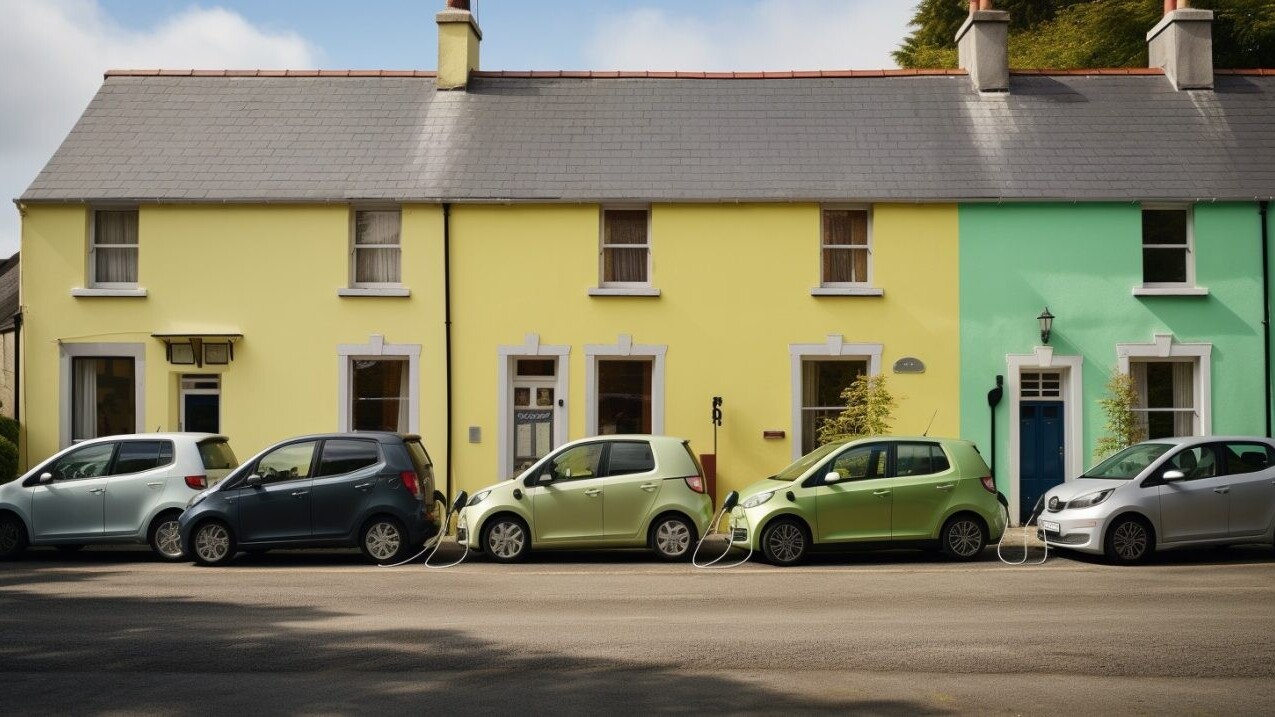
Next month, 50 homeowners in Ireland will start renting out their home electric car charging points to their neighbours with the help of a new app. It’s “the Airbnb of electric vehicle (EV) home chargers,” says GoPlugable co-founder Maebh Reynolds.
The app’s trial launch will be limited to that first group of 50 people who have their own charging point at home, and around 50 people with electric cars who would like to park up and pay to use them. If all goes well, a wider public launch could follow in September or October.
“We are drastically falling behind in terms of public charger availability,” says Reynolds of the charging network in Northern Ireland, as she explains why she and her co-founder decided to develop the app. “For a lot of people, it’s the main reason why they won’t switch to electric vehicles.”
Such is the dearth of charging points that Reynolds says she has heard from individuals in Ireland who are already handing over cash to neighbours with chargers on an ad hoc basis, just so they can juice up their EV. In the GoPlugable app, such neighbours are defined as “hosts,” and the platform is designed to help them manage payments and advertise their charging point to more EV owners in their area.
To date, Belfast-based GoPlugable has raised £50,000 via competitions and grants, and the company has a headcount of two co-founders and two interns.
Worst in Europe?
It’s just one of many private businesses aiming to improve the EV charging network across Ireland. In Northern Ireland, there are 20 public charging points per 100,000 people — far below the UK average of 60 per 100,000. And last year, price comparison service Uswitch named the Republic of Ireland the worst place to own an EV out of a list of 34 European countries.
In the Republic, 80% of charging occurs at home, which suggests a severe lack of public charging infrastructure. The Irish Electric Vehicle Association estimates that there are around 2,000 public chargers in the country – but not many of them are rapid chargers.
These devices can fully power up some EV batteries in less than an hour. But in the Republic, a country of five million people, there are only a few hundred such chargers available to the public, though this number is set to more than double under government plans.
GoPlugable’s approach is based on opening up access to domestic chargers in communities in Northern Ireland and the Republic of Ireland. Hosts will be able to set whatever price they like for, say, a 60-minute charge, says Reynolds, and EV owners will have to go through identity verification and submit their vehicle registration to the app before being able to book a slot.
This might be convenient if you live near someone with a charger who’s willing to rent it out – but what if you just need some power, quickly, while out and about?
“There needs to be some good on-street solutions, possibly some good local hubs,” says Jade Edwards, head of insights at Zapmap, which has charted the location of thousands of public chargers around the island of Ireland.
If hubs are the answer, someone is going to have to build them. Weev, a Belfast-based startup recently received £50 million in funding from UK energy firm Octopus to greatly scale up the EV charging network in public areas in Northern Ireland. The firm will focus on establishing hub-style sites with multiple chargers, including at locations along major arterial routes.
The need is growing. EV ownership is rising in Northern Ireland at a noticeably high rate – with a 72% increase in battery electric vehicle registrations there in the third quarter of 2022 compared to the third quarter of 2021.
“We have about 30 sites at the moment with 70 public chargers,” says Weev chief executive Philip Rainey. “Moving from that position to having over 3,000 chargers around the province is the challenge.”
New EV registrations across Ireland since 2013
| Year | Northern Ireland | Republic of Ireland |
|---|---|---|
| 2013 | 86 | 56 |
| 2014 | 223 | 268 |
| 2015 | 436 | 604 |
| 2016 | 502 | 704 |
| 2017 | 551 | 986 |
| 2018 | 589 | 2,056 |
| 2019 | 579 | 5,115 |
| 2020 | 1,680 | 7,271 |
| 2021 | 3,779 | 17,327 |
| 2022 | 5,947 | 23,928 |
Source: Electric Vehicle Association Northern Ireland (EVANI) / UK Department for Transport / Irish Electric Vehicle Association (IEVA)
Don’t make me wait
Weev wants to achieve this in just three years and the vast majority of chargers will be rapid chargers, he emphasises. The devices are popular with users because they let them power up their vehicles even while making a quick visit to a shop or while attending a work event at a hotel, for example. The company currently has a headcount of just over 20 people but is planning to increase this to 50 during the next 12 months.
One huge hurdle in Northern Ireland, according to the Electric Vehicle Association Northern Ireland (EVANI), a non-profit, is the sheer cost of setting up new connection infrastructure whenever someone decides to build an EV charging hub.
Unlike the rest of the UK or Ireland, in Northern Ireland, installers must sometimes stump up 100% of the funds required for upgrading the electricity network in the area in order to connect the new chargers to it. Elsewhere, such costs are often “socialised” or spread across multiple users of the network.
It is a kind of “first mover disadvantage”, argues Mark McCall, EVANI co-founding director and chairman: “Not only does that affect EVs, it affects connection of wind turbines and heat pumps, solar — all these low-carbon technologies.”
Depending on the scale and location of the hub, it could mean that the price tag for installing it runs into the millions whereas, in Great Britain, the same hub might only cost a few hundred thousand pounds to set up, EVANI suggests.
TNW asked NIE Networks, which owns the electricity network in Northern Ireland, for comment on this situation but did not receive a response.
Charging ahead
Rainey says that Weev intends to be “strategic” about where it sites new hubs, and will piggyback on under-used electricity network infrastructure at certain locations, to avoid excessive charges for new connections.
Meanwhile, in the Republic of Ireland, there is also a huge push to improve the public EV charging network, says Ricky Hill, Ireland Country Manager at Monta, a Danish startup that has developed software to help charging point operators manage their devices.
“We know we need to put more in because the rate that EVs are being bought now is really increasing,” he says, adding that Monta covers just under 3,000 charging points across the island of Ireland. Within 18 months, that number should rise to between 17,000 and 20,000 chargers, estimates Hill. Monta employs 170 people and has raised €50 million to date.
The company’s software gives operators a live view of available charging points on their own network, including whether a specific charger is currently in use, and any indications of downtime.
In the near future, the platform will introduce new features such as smart charging based on variable energy prices, says Hill. In total, Monta helps to manage 90,000 chargers, most of which are in Europe, where growth of EV charging infrastructure has, in general, been “phenomenal” lately, says Hill.
Ireland might have been slow off the mark — but it now seems ready to join the EV party in earnest.
Get the TNW newsletter
Get the most important tech news in your inbox each week.





